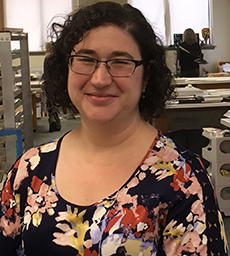Conservation Center for Art & Historic Artifacts
"You get a brain trust...."

For a society rapidly becoming accustomed to everything being digitized, the idea of preserving paper documents may seem somewhat antiquated. But since 1977, Philadelphia’s Conservation Center for Art & Historic Artifacts – one of only about a half-dozen such nonprofits in the U.S. – has been specializing in paper conservation, preserving archival and historic documents, artworks, photographs, and books, from family photos to the nation’s founding documents. CCAHA’s clients include museums, private collections, state archives, and other institutions and individuals, providing expertise, leadership, training, education, and consulting services to preserve the world’s cultural heritage. CCAHA’s Preservation Services team also helps institutions assess and safeguard their collections. The staff of 34 conservators, archivists, and digital imaging specialists present workshops, conduct conferences, and create facsimiles that provide access to fragile objects. They provide conservation treatment services on paper goods ranging from baseball cards to rare books, from papyrus and parchment to maps and posters, from historic wallpaper to musical scores.
When Laura Hortz Stanton was named Executive Director, CCAHA had already been working with Your Part-Time Controller for many years. YPTC helped CCAHA to transition into a new accounting system and developed cost accounting for the Center’s various programmatic lines, providing accurate data that inform important decisions.
“We’re an organization that grows or shrinks depending on our contracts, so the flexibility that Your Part-Time Controller offers is really helpful for us,” she says.
Above and beyond YPTC’s financial services, Hortz Stanton sees many direct parallels between how CCAHA and YPTC “demystify” complex processes, whether in document preservation or accounting procedures.
“It’s interesting how similar we operate to YPTC along parallel lines of thinking,” she says. “What our conservators do can sometime seem like magic as they use their art and craft to put things together; their work demystifies the process of what we do. YPTC does the same with finances. I know that I’m not an expert and I’ll never understand accounting law, but YPTC helps me understand finances on my level so that I can explain things. They help me know what I don’t know.
“As an executive director, I have a lot on my plate. I don’t have to keep up to date on the latest news and regulations, knowing that YPTC will stay on top of things. Knowing that there are people in YPTC that I can hand things off to is very valuable.”
What YPTC tells its clients abut outsourcing is also similar to what CCAHA tells its clients who find that it isn’t economically cost-effective for them to staff their own conservation services. “We tell our clients, ‘When you work with us, you’re not limited to the expertise of a single conservator – you get a brain trust.’ YPTC works the same way. If our associate doesn’t know the answer to something there’s a brain trust to go back to.”
Another similarity linking the two organizations is information design and delivery. Much as CCAHA’s work involves making information more attractive and understandable, Hortz Stanton appreciates how YPTC makes financial data more visual and comprehensible. YPTC helps her to transmit important financial information to her board, in formats that the board can understand and without requiring a lot of staff time for explanations.
“I started out in arts and history,” she says. “I’ve learned nonprofit management but I don’t really have a background in finances. For us – an organization whose business is making things neat and tidy – YPTC’s work isn’t just about the numbers. It’s about communicating the numbers.”





